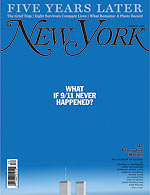“[A]s those who believe that he is following a wise course shrink to an almost insignificant remnant, as the very architects of the policies he now defends repudiate their own work, as the political cost of his current path becomes increasingly apparent to almost any sentient person, Bush — who may still have time to redeem at least some part of his legacy — still appears to be oblivious both to the downward spiral of his presidency and to his own likely place in history.” Ted of The Late Adopter points the way to New York Magazine‘s roundtable discussion of Dubya’s mindset these days, which includes a diagnosis by my advisor/employer, Alan Brinkley. (Other notable participants include Dahlia Lithwick, Jonathan Alter, Ted Sorenson, Melvin Laird, and Gary Hart.)
Tag: Dahlia Lithwick
Power Mad.
“In some sense, the president is now as much a prisoner of Guantanamo as the detainees…The endgame in the war on terror isn’t holding the line against terrorists. It’s holding the line on hard-fought claims to absolutely limitless presidential authority.” Slate‘s Dahlia Lithwick discerns the method in Dubya’s madness on the civil liberties front: “expanding executive power, for its own sake.“
A Bad Year.
“Whenever the courts push back against the administration’s unsupportable constitutional ideas…the Bush response is to repeat the same chorus louder: Every detainee is the worst of the worst; every action taken is legal, necessary, and secret. No mistakes, no apologies. No nuance, no regrets. This legal and intellectual intractability can create the illusion that we are standing on the same constitutional ground we stood upon in 2001, even as that ground is sliding away under our feet.” Slate‘s Dahlia Lithwick surveys the top ten most outrageous civil liberties violations of 2006.
Prison Break.
After fierce debate among the neocons, Dubya comes clean about the CIA’s secret prisons (outed by the Post last November) and moves the detainees held therein to Gitmo. But don’t think this moment of clarity means King George is playing it straight just yet: He’s also asking Congress to sidestep recent court decisions and grant him power to continue wiretapping without warrants and to torture alleged evildoers with impunity. And even moderate Republicans and military lawyers have issues with his recent attempts to deny suspected terrorists due process.
Update: Slate‘s Dahlia Lithwick has more: “The speech teemed with all the rhetorical wizardry you might expect of a do-over. Bush justified torture and extraordinary rendition while denying that they exist. He stuck a fork in the eye of the Supreme Court while agreeing to be bound by the majority’s decision. He conceded that Congress should play a role in creating military tribunals while demanding that it greenlight his plan.“
Just another day in Lower Manhattan.
As the five-year anniversary approaches, New York Magazine wonders “What if 9/11 never happened?”, putting the question to Andrew Sullivan, Thomas Friedman, Dahlia Lithwick, Frank Rich, Tom Wolfe, Doris Kearns Goodwin, Fareed Zakaria, Douglas Brinkley, and others. (By way of Lots of Co.)
Passing the Buckley.
Boo hiss. The Supreme Court decides 6-3 to strike down a Vermont campaign finance law, which was conceived in part as a challenge to Buckley v. Valeo. “The result appears to doom any future efforts to impose spending limits on state or federal campaigns, legal analysts said.” And, in related news, Slate‘s Dahlia Lithwick and Walter Derringer discuss recent Supreme Court decisions, with special attention to the recent capital punishment case, Kansas vs Marsh.
Full Slate.
“Where is the analyst at a firm called Forrester Research who used to be quoted everywhere calling us, witlessly, ‘the Slatanic’? Haven’t heard much from him lately.” A happy 10th anniversary to Michael Kinsley’s Slate, home to Dahlia Lithwick, Fred Kaplan, Seth Stevenson, and several other writers and journalists invariably worth checking out.
Goodbye Gulag?
“The most important aspect of the president’s comment isn’t just that he acknowledged, at least tacitly, that Gitmo is a disaster and must be closed; or even that he acknowledged that detainees have a basic right to some adjudicatory process. These two concessions are momentous, but they pale next to his admission that he is in any way bound by the decision of the high court — that the court will have the last word on anything to do with the war on terror.” Slate‘s Dahlia Lithwick dissects some surprising recent comments by Dubya on Guantanamo Bay, and ponders the future of the Gitmo Gulag. “[Recent] silent mass releases do suggest that Donald Rumsfeld’s famous 2002 claim, that the then-760 prisoners at Guantanamo were ‘the worst of the worst,’ was something of an overstatement. They were probably closer to ‘the best of the worst,’ or as I’ve suggested, ‘the least lucky of the middling.’ The actual worst of the worst have been relegated to a whole other secret prison system that actually makes Guantanamo look rather attractive.”
Flip you for real.
“Leave it to Justice Antonin Scalia to trigger a nationwide debate about the hermeneutics of chin flips.” From an “empaneled jury” of Sopranos actors to Justice Scalia’s uncharacteristic appeal to foreign precedent, Slate‘s Dahlia Lithwick muses on the sideshow surrounding the Justice’s recent Sicilian kiss-off.
Framing a Guilty Man?
“In all the years I have been on the bench, I have never seen such an egregious violation of a court’s rule on witnesses.” In keeping with this administration’s penchant for cutting corners on civil liberties (and playing right into the hands of America’s critics), the trial of Al Qaeda operative Zacarias Moussaoui, the so-called “20th hijacker,” appears on the verge of mistrial after it comes out that government lawyer Carla Martin blatantly coached witnesses. Said Judge Leonie Brinkema: “This is the second significant error by the government affecting the constitutional rights of this defendant and, more importantly, the integrity of the criminal justice system in this country.” Update: Slate‘s Dahlia Lithwick tries to explain the strange “medical malpractice” reasoning at work in this death penalty case.

